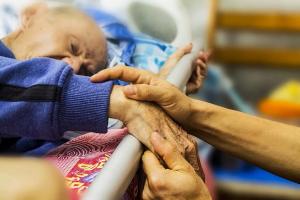
In both the US and UK in recent weeks, disabled people have been denied care for COVID. This is pure ableism (discrimination based on disabilities). The disabled deserve equal care to others. In the UK, they are putting DNR (Do Not Resuscitate) orders on people; while in the USA, a disabled man with COVID was starved to death. Let’s look at the two cases then remind ourselves of the moral issues.
Illegal DNR Orders
Forbes reported:
A report due to be launched this week by disability advocacy organization Inclusion London affirms the fear many disabled people have experienced throughout the pandemic over being denied life-saving treatment, should they become seriously ill with coronavirus.
In the report entitled, “Abandoned, forgotten and ignored – the impact of Covid-19 on Disabled people”, several survey respondents attested to being pressured by their doctor to have DNR, or Do Not Attempt Cardio Pulmonary Resuscitation orders placed on their medical records.
This is further supported by research carried out last month by disability charity Scope, which found that 63% of disabled people feared they would not receive the treatment they needed if they were hospitalized due to coronavirus.
A more insidious practice has also been brought to light in which some doctors have been placing unlawful DNR orders on the records of individuals with learning disabilities without prior consultation with the person’s family or carers.
If you want, read the rest of this sad story.
Starving a Black Disabled Man
LifeNews reported on the case of Michael Hickson:
Michael Hickson, a 46-year-old COVID-19 patient, was starved and left without adequate treatment for his illnesses at St. David’s South Austin Medical Center. His wife, Melissa, says the hospital refused to treat his illnesses because of his disability.
Michael Hickson became quadriplegic due to receiving CPR after he went into sudden cardiac arrest while driving Melissa to work in May 2017. Melissa and their five children stayed by Michael’s side throughout his recovery. He landed back in the hospital in 2020 after contracting COVID-19 and pneumonia from a staff member at his nursing home…
The doctor soon told Melissa her husband would be placed in hospice against her will. In a recorded conversation, the St. David’s doctor told Melissa her husband would not receive treatment because of his disability, despite her wishes. […]
Michael was left without food or treatment for six days despite Melissa’s will to save her husband. He passed away from the untreated illnesses on June 11, 2020.
You can read the rest on their site.
Wrong on So Many Levels
I dealt with similar issues about autistics being given DNR orders against their will in April. From that article, I think what Fr. Tad Pacholczyk (from the NCBC) writes is key:
If a DNR order is chosen, the condition of the patient must be such that the intervention would be of no significant benefit to him or her. Sometimes out of a generalized fear of medical technology, people may decide to put a DNR in place many years before any serious medical situation arises. Without knowing the medical particulars of their own future situations, however, this would be an unwise and ill-advised step. […]
So when death is imminent, and disease states are very advanced (perhaps with multiple organ failure), and assuming other spiritual matters, such as last sacraments, have been addressed, a DNR order may not raise any moral problems. The key consideration in making the judgement will be to determine whether the benefits of resuscitation outweigh the burdens.
Charlie Camosy also noted the issues with how triage is often done and how it discriminates against the disabled:
Far too often, a Quality-Adjusted Life Year (QALY) model of rationing care leads to ageist (and ableist) results. QALY model assumes added life years (along with quality of life) are to be taken into consideration when determining whether and how patient would likely benefit from ventilator. Especially if one believes we ought to prioritize the most vulnerable…it is a terrible approach.
Thus, a blanket order of DNRs or forcing a DNR on a disabled person despite their spouse’s concern is definitely immoral. DNRs are not intrinsically evil but should always be given after consultation.
Conclusion
Also from my April article:
In the… disability community, a rallying cry has been “nothing about us without us.” This is usually about parents or caregivers making all the decisions and doing all the activism. I find this applies here a fortiori. It is not someone who cares about this autistic adult trying to make the best decision for them (even if slightly misguided); it is a faceless bureaucracy saying that our lives aren’t valuable enough to save. This is discrimination. This is indirect euthanasia. Indirect because these autistic individuals are left to die when their lives are likely able to be saved. A DNR order is something a person might decide with their family while late in a terminal illness, it is never something that should be applied to whole classes of people. Jesus weeps for the suffering of these people.
Note: please support me on Patreon so I can write more on disability ethics from a Catholic perspective.












